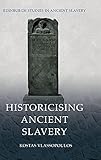Historicising Ancient Slavery / Kostas Vlassopoulos.
Material type: TextSeries: Edinburgh Studies in Ancient Slavery : ESASPublisher: Edinburgh : Edinburgh University Press, [2022]Copyright date: ©2021Description: 1 online resource (280 p.)Content type:
TextSeries: Edinburgh Studies in Ancient Slavery : ESASPublisher: Edinburgh : Edinburgh University Press, [2022]Copyright date: ©2021Description: 1 online resource (280 p.)Content type: - 9781474487214
- 9781474487238
- 306.362093 23
- HT863 .V53 2021
- online - DeGruyter
| Item type | Current library | Call number | URL | Status | Notes | Barcode | |
|---|---|---|---|---|---|---|---|
 eBook
eBook
|
Biblioteca "Angelicum" Pont. Univ. S.Tommaso d'Aquino Nuvola online | online - DeGruyter (Browse shelf(Opens below)) | Online access | Not for loan (Accesso limitato) | Accesso per gli utenti autorizzati / Access for authorized users | (dgr)9781474487238 |
Frontmatter -- CONTENTS -- Series Editor’s Preface -- Acknowledgements -- Abbreviations -- 1. Introduction -- 2. Historiographies -- 3. What Is Slavery? -- 4. Slaving Strategies and Contexts -- 5. Enslaved Persons -- 6. Dialectical Relationships -- 7. The Slave View of Slavery: Slave Hopes and the Reality of Slavery -- 8. Slaving in Space and Time -- 9. Conclusions -- Bibliography -- Index Locorum -- General Index
restricted access online access with authorization star
http://purl.org/coar/access_right/c_16ec
A new framework for studying slaves and slavery in ancient societiesOffers a new theoretical framework for the study of ancient slaveryEmploys a global historical perspectiveFocuses on the agency of ancient slavesExplores the link between slavery and historical change in antiquityExamines the multiple contradictions within slave systemsExamines slavery from an economic, social, political and cultural perspectiveInformed by the global history of slavery, Kostas Vlassopoulos avoids traditional approaches to slavery as a static institution and instead explores the diverse strategies and various contexts in which it was employed. In doing so he offers a new historicist approach to the study of slave identity and the various networks and communities that slaves created or participated in. Instead of seeing slaves merely as passive objects of exploitation and domination, his focus is on slave agency and the various ways in which they played an active role in the history of ancient societies. Vlassopoulos examines slavery not only as an economic and social phenomenon, but also in its political, religious and cultural ramifications. A comparative framework emerges as he examines Greek and Roman slaveries alongside other slaving systems in the Near East, the Mediterranean and the Black Sea.
Mode of access: Internet via World Wide Web.
In English.
Description based on online resource; title from PDF title page (publisher's Web site, viewed 29. Mai 2023)


